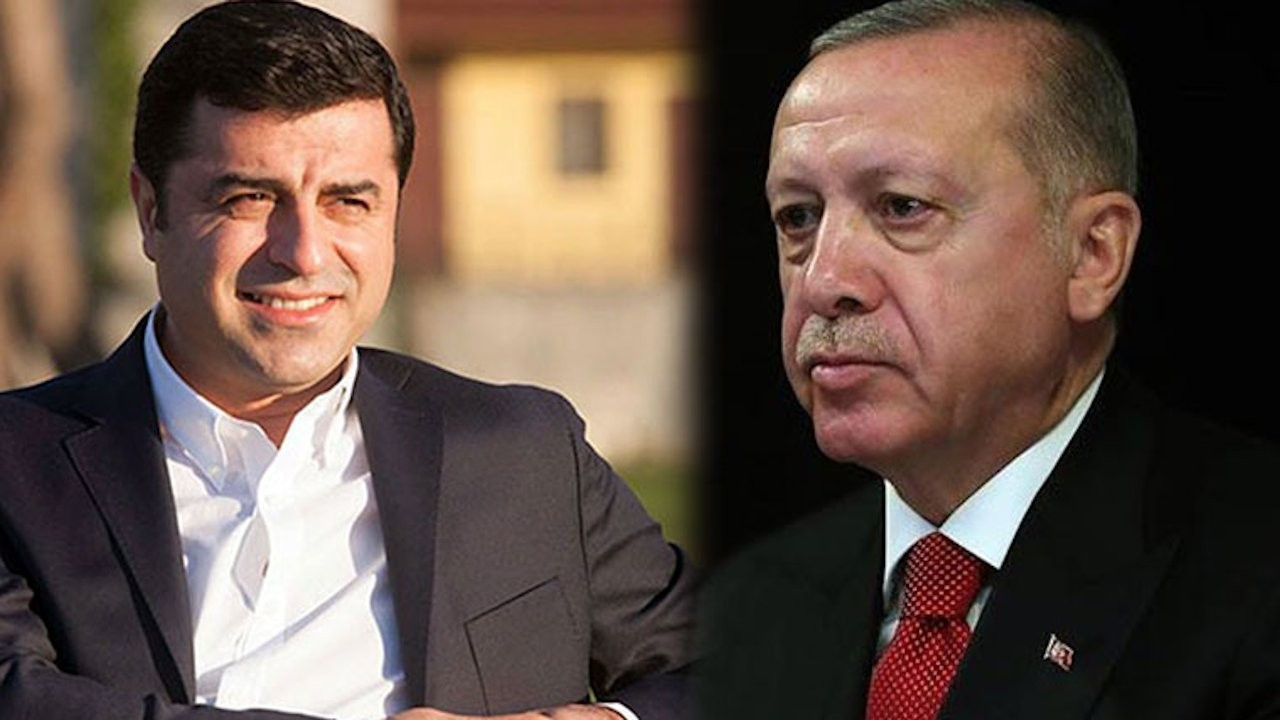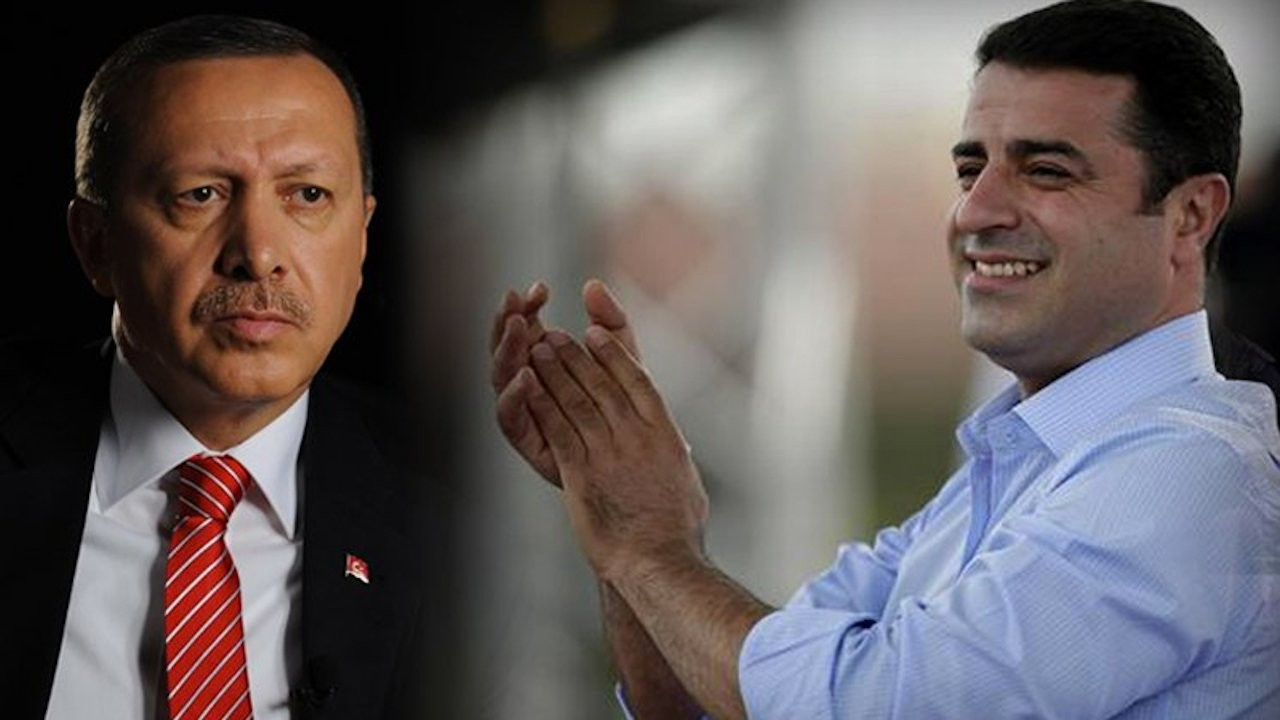Top Europe rights court orders immediate release of Kurdish politician Selahattin Demirtaş
The ECHR on Dec. 22 ruled that Turkey should take all necessary measures to secure prominent Kurdish politician Selahattin Demirtaş's immediate release from prison. The Grand Chamber of the ECHR said Demirtaş's arrest had sent a dangerous message to Turkish people, which it said was “a matter of indisputable gravity for democracy.” Demirtaş responded to the ruling on Twitter, saying the ECHR ruling has shown that the judicial processes against him and his friends had been all "political."
Duvar English
The European Court of Human Rights (ECHR) on Dec. 22 ruled that Turkey should take all necessary measures to secure prominent Kurdish politician Selahattin Demirtaş's immediate release from prison.
The top human rights court said that it did not see evidence in decisions for Demirtaş's detention that linked his actions and the alleged terrorism-related offenses.
The court said that the detention of former Peoples' Democratic Party (HDP) co-chairman has sent a "dangerous message" to Turkish people and is "merely a cover for an ulterior political purpose."
"The applicant’s initial and continued pre-trial detention not only deprived thousands of voters of representation in the National Assembly, but also sent a dangerous message to the entire population, significantly reducing the scope of free democratic debate," the court's ruling said.
"These factors enable the Court to conclude that the purposes put forward by the authorities for the applicant’s pre-trial detention were merely cover for an ulterior political purpose, which is a matter of indisputable gravity for democracy."
Later on Dec. 22, ruling Justice and Development Party (AKP) spokesperson Ömer Çelik commented on the ECHR's ruling, saying the Turkish judiciary will "evaluate" it.
"This is a newly given decision. It consists of a 100-150 pages long detailed ruling. Our judiciary system will evaluate it and come up with an approach accordingly," Çelik said.
Demirtaş: ECHR ruling confirms judicial processes have been all 'political'
Demirtaş responded to the ruling on Twitter, saying the ECHR's ruling has shown that the judicial processes against him and his friends had been all "political, not lawful."
"This decision is an affirmation that the legal and justice system in Turkey has been brought down at the hands of the government. It has become finalized that the so-called judicial processes led against me and my friends for the six years are all political, not lawful, that we are innocent, and those who put us in jail have committed heavy crimes to the extent that they have politically plotted against us," Demirtaş said.
AİHM Büyük Daire kararı hakkındaki görüşlerimi paylaşıyorum. pic.twitter.com/u7QPpWpkmi
— Selahattin Demirtaş (@hdpdemirtas) December 22, 2020
The politician's wife Başak Demirtaş also took to Twitter to respond to the ECHR's ruling, saying Demirtaş's "innocence" has been certified. "His imprisonment for four years was a heavy crime, and as of this minute, the prevention of his release will also constitute a mental cruelty crime," she wrote.
Selahattin’in suçsuz olduğunu halk biliyordu ve şimdi AİHM Büyük Daire tarafından da kesin olarak tescillendi. Dört yıldır içeride tutulması ağır bir suçtu, şu dakikadan itibaren tahliyesinin
— Başak Demirtaş (@Basak__Demirtas) December 22, 2020
engellenmesiyle manevi işkence suçu da oluşacaktır. #DemirtaşİçinÖzgürlük
HDP co-chairs Pervin Buldan and Mithat Sancar released a joint statement with regards to the ECHR's ruling saying it is "final and binding." "With this decision, all cases of plots and political operations led against democratic politics for the last four years as well as case files that have been made to build on them have been nullified," they said.
EP rapporteur: Respecting rule of law means freeing Demirtaş
Shortly after the announcement of the ruling, former European Parliament Turkey rapporteur, Kati Piri called on the Turkish government to release Demirtaş.
“Enough lives ruined. Enough pain inflicted. Enough injustice. Release Selahattin," she tweeted.
European judges have spoken and came - to nobody’s surprise - to conclusion that @hdpdemirtas is innocently jailed now for 4 years and must be immediately released. #freedemirtas https://t.co/IKtk8LbMjq
— Kati Piri (@KatiPiri) December 22, 2020
Nacho Sanchez Amor, the current Turkey rapporteur of the European Parliament, said: “No more excuses for Turkey’s authorities: Respecting rule of law means freeing Demirtas.”
@ECHR_CEDH's Grand Chamber has ruled & reconfirmed that former @HDPgenelmerkezi's Co-Chair @hdpdemirtas must be released immediately. He spent over 4 years in prison for political reasons. No more excuses for #Turkey's authorities: respecting #ruleoflaw means freeing #Demirtaş!!
— Nacho Sánchez Amor (@NachoSAmor) December 22, 2020
One of Turkey’s best-known politicians, Demirtaş has been in jail for more than four years on several charges including terrorism. Demirtaş chaired the HDP between 2014 and 2018.
He faces 142 years in jail if convicted in the main trial against him in which he is accused of being the leader of a terrorist organization over his actions during protests in 2014.
In that year the protests in Turkey's mainly Kurdish southeast accused the army of standing by as ISIS militants besieged the Syrian Kurdish town Kobani, just across the Syrian border. The protests turned violent and led to the deaths of 37 people.
In 2018, a chamber of the ECHR ruled that his right to a speedy trial had been violated given his lengthy detention without a final conviction.
President Recep Tayyip Erdoğan responded at the time by saying Turkey would make its counter-move against the ruling. Shortly after, an appeals court approved a jail sentence against Demirtaş on charges of disseminating terrorist propaganda for a speech he made in 2013, thereby finalizing his conviction.
Erdoğan's recent pledges of legal reform had led to some speculation that Demirtaş may be released. But Erdoğan rejected that idea last month, calling Demirtaş a terrorist and saying he has the "blood of thousands of Kurds on his hands."
The opposition has accused Erdoğan and his ruling Justice and Development Party (AKP) of seeking to quash dissent by bending the judiciary and jailing opposition members and critics since a 2016 failed coup. The government has said its actions are justified by threats facing the country and that courts make decisions independently.

 Judicial reforms won't protect jailed Kurdish politician Selahattin Demirtaş: ErdoğanPolitics
Judicial reforms won't protect jailed Kurdish politician Selahattin Demirtaş: ErdoğanPolitics There's no Kurdish issue in Turkey, Selahattin Demirtaş is a terrorist: ErdoğanPolitics
There's no Kurdish issue in Turkey, Selahattin Demirtaş is a terrorist: ErdoğanPolitics